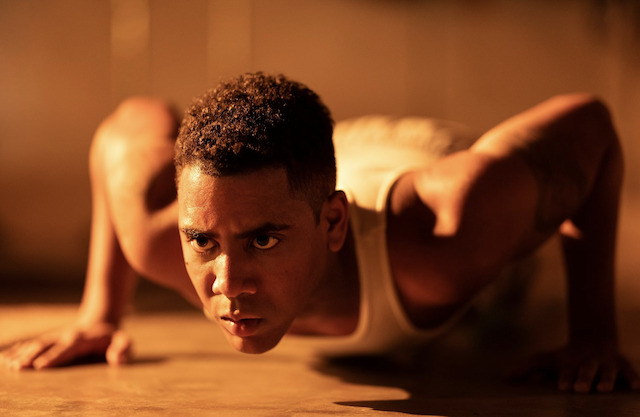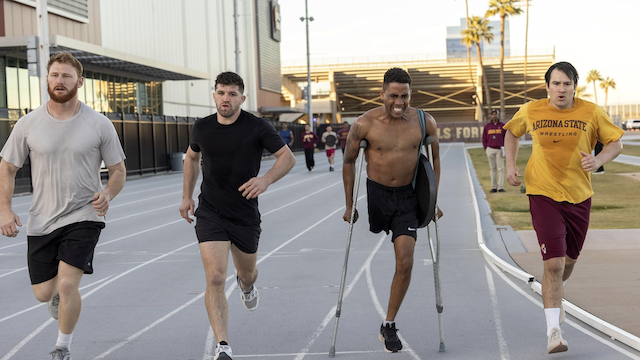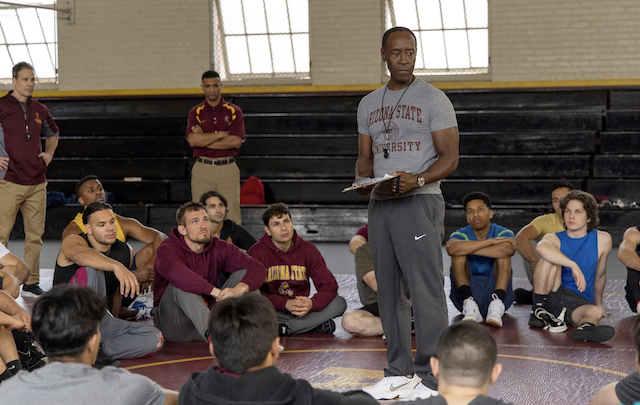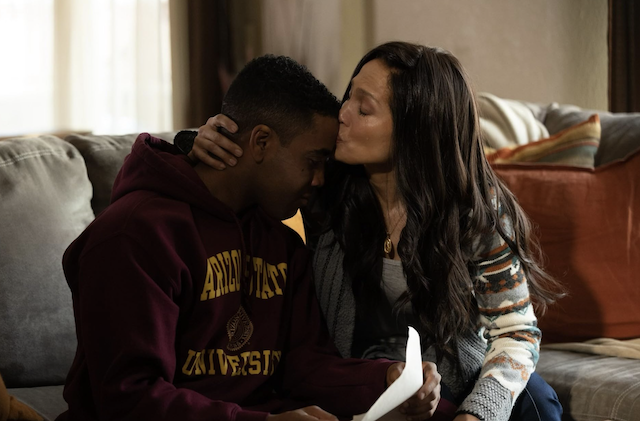
@Courtesy of Amazon Studios

Q&A with Actors Jennifer Lopez, Jharrel Jerome & Director William Goldenberg
Q: This is your directorial debut. What made it feel like the right thing to develop as a director?
William Goldenberg: I’ve read Anthony Robles’ book and talked to one of the producers David Crockett about making a film. And then I wanted to meet Anthony and his mother Judy. So I flew to Arizona to meet the two of them. I spent a month more with Anthony, meeting him was one of the most extraordinary things I’ve had the pleasure of doing in my life. I’ve never been around somebody who wherever he goes seems to spread good will, he’s the kindest and most graceful person I’ve ever known. It was also a genre I felt comfortable with, the sports genre, the dramatic scenes I felt comfortable with too. As an editor, they’re my favorite things to cut, so it was a combination of all that, it was the right time in my life to do it.
Q: You have been attached to this project since 2019. Talk a bit about getting the script and what appealed to you as an actor about taking on this role.
Jharrel Jerome: Yes. I got a call. This was like my first time getting a call. They were like: “Hey, there’s this story. If it interests you or if it feels like it challenges you, would you want it?” The first thing I did was watch this YouTube video. It’s about 12 minutes long of Anthony doing an interview after he won a match. And just like William said, he’s lighting up the entire interview. He’s so charismatic. He’s so charming. And then the next video is him in the match, body slamming this man so aggressively, the nice guy was gone. As an actor that’s very exciting, there’s a duality there and layers that I wanted to figure out. It challenged me physically more than anything ever. I got to learn not only wrestling, but I got to appreciate a new sport and a new way of letting off steam. I got to train with Anthony for seven months straight. We trained five days a week, two hours on the mat, all the way from the basics of wrestling, the history of wrestling, all the way down to the technique and style because Anthony Robles is like no one else.
Q: Jennifer, your performance is transformative. Talk a little bit about taking on this role: what did appeal to you about playing Judy and did you begin your process of becoming her?
Jennifer Lopez: For me reading the script and seeing what it was, I felt it was at first a smaller part in Anthony’s story. Then as I got to talk to Judy and Anthony what surprised me was how much we really delved into the truth of their relationship. What they meant to each other and how they inspired each other. If you talk to Judy’s kids, she’s always so good, she’s so encouraging, she’s the best mom. And then you talk to Judy and it’s just like: “I don’t deserve any credit!” There’s again a real duality to this person.
I like playing real-life people because you get to get into such minute details about someone. Judy was very open with me, because what makes this so triumphant is the struggles mother and son had to go through. I tried to make it as comfortable as I could for them to let them know that they could trust me, that Judy could trust me, that Anthony could trust me. It was a real honor for me to play a mother, she inspired me. I always feel like my best roles, I always take away something new about myself from them. And for sure I did with this role.

@Courtesy of Amazon Studios
Q: What does the process look like when you have access to the real person? What does the work look like?
Jennifer Lopez: It’s very different. I mean, the approach is the same. It’s just like delving into their life, talking to their family, getting not just their perspective, but other people’s perspective of who they are. It’s really important. I could just go to Judy and say: “Hey, what did you do here? What was this moment like? What did you say to each other?” There’s a picture that I had in my trailer, when he won the championship, and she’s leaning over to him, and he’s there smiling, two of them are looking at each other. I asked Antohny: “What was that moment?” And she said to me, “You did it.” And I said: “We did it.” It’s little moments like that where if the person is there, like you can add more reality to it, you can add more. I ran to Billy immediately and I was like: “Please can we do this?” and he was like, “Yes, sure!” And that’s a testament to Billy as a director, a first -time director, too. You don’t know how much you let actors go wild, and how much do you reel them in.
Q: Can you tell us a bit about it from your perspective? How was it getting into the physicality of what Anthony does?
Jharrel Jerome: It was interesting, I don’t know how often as an actor when you get to play somebody real, you get to be around the person all day, every day, all the way through shooting. I got to just observe a lot. I got to watch him not only be the tough wrestler and the guy who’s in control on the mat. I got to use a lot of that. It was very helpful. As for the physical part, Anthony is the best wrestling trainer in the world, I’ll tell you that much. He was so great at breaking things down and teaching me, taking it step by step, which is what makes him a great coach. I just came and put the work in. It was a good time. It was a great time.
Q: Was there a scene that you were most excited to do or most nervous about either because it was cinematically challenging, or because it philosophically encapsulated the heart of the film?
William Goldenberg: Every day was a mix of being terrified and being aware that you had to do it. The hike was the most difficult day logistically, getting up that mountain and then having to move locations. Every day was a challenge because it was all new to me. I’ve been in movie sets hundreds of times but it’s not the same as making every decision, so I tried to channel everything I’ve learned from every great director I’ve had the good fortune to work with. I felt like every day took 100 % of my attention, 100 % of my physical and mental energy. I just put my head down and decided to just do it.

@Courtesy of Amazon Studios
Q: You’ve worked with so many incredible directors as an editor. Was there anyone you reached out to that gave you some wisdom that helped you with the endurance test that is making a feature film?
William Goldenberg: I reached out to all of them. I reached out to Michael Bay about visual effects because he’s an expert. I talked to Ben Affleck, I talked to Paul Greengrass, Kathryn Bigelow, because the way I shot this film was inspired by their style. It’s a very handheld, first person film, trying to put the audience in the room with the characters. It was very much inspired by how Paul and Catherine shoot. So they were all so generous with their time, all of them. Michael Mann walks around every day with a piece of paper, the script pages, he’s worked on on one side. And on the other side, he just writes down all the intentions of every line, and what those lines mean, what the high points of the scene are. You don’t want to forget those things, so I picked that up from him.
Q: A whole other film could be made about Judy’s life after the credits roll…
Jennifer Lopez: There’s a whole other story there, right? How she went through school, how he inspired her to go back to school. There’s nuances there that would be really, really interesting. It would have been a three-hour film. Judy is a very interesting woman, a very interesting character, and a very relatable woman. Having a baby at 16 years old you have to grow up too fast, you have to become a mom, one thing after the other until you catch up with yourself. That’s what makes the character in the film somebody that draws you in and makes you feel like: “I know that person. I relate to that person. I am that person.” I felt very much that way when I was doing the film. It was healing for me.

@Courtesy of Amazon Studios
If you like the Q&A, share your thoughts below.
Check out more of Adriano’s articles.
Here’s the trailer of Unstoppable:

